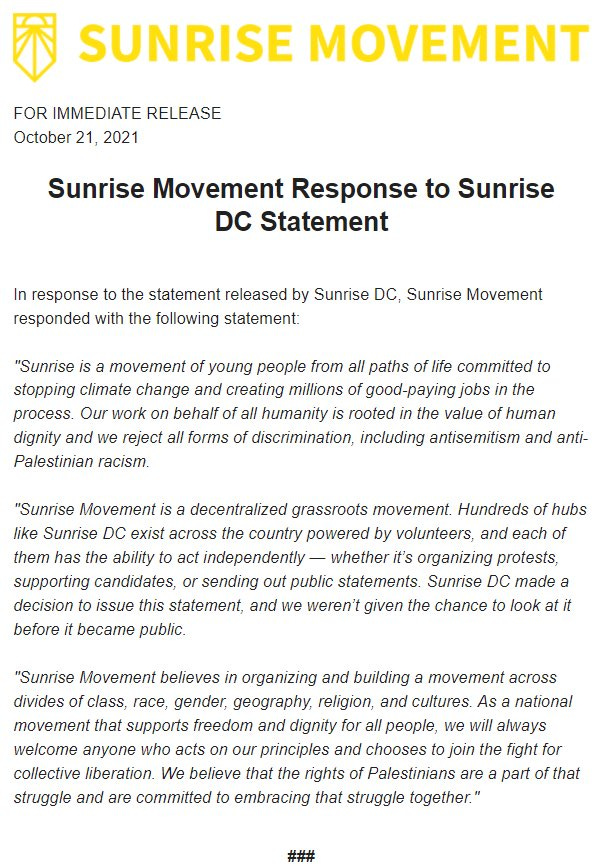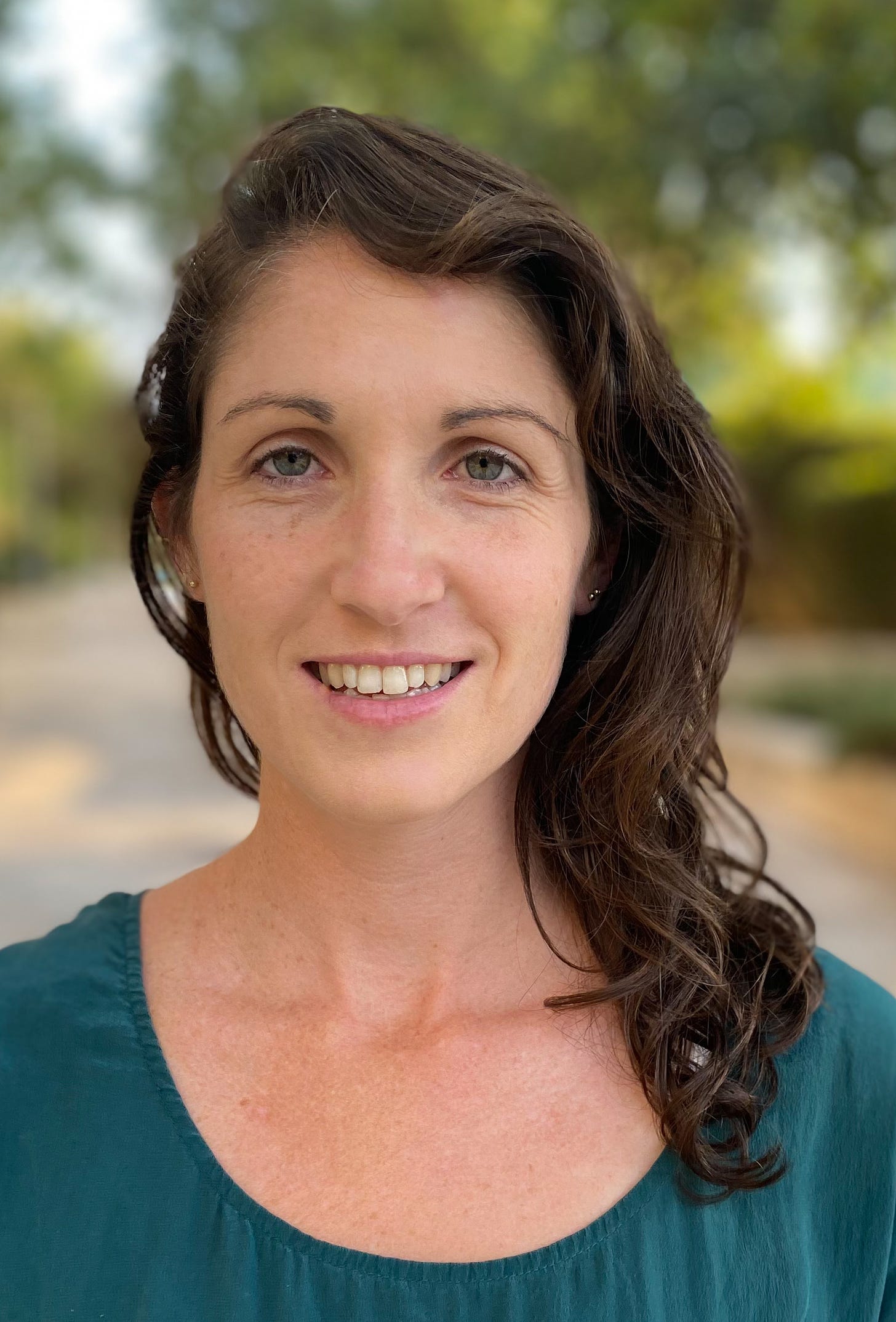When "unprecedented times" are not-at-all-unprecedented
And how the Sunrise Movement controversy proves that on one issue, at least, Theodor Herzl was dead wrong
The kerfuffle over Sunrise DC is likely to have died down by the time you read this, since the national Sunrise movement chastised the local DC chapter for being antisemitic, and the local chapter said that it was “taking time to reflect, learn, and think carefully.” But even as they backtrack, we would be foolish to gloss over what transpired and what it tells us about where anti-Zionism and antisemitism in America are headed.
In case you missed it, Sunrise DC, the local chapter of a national organization devoted “to stop climate change and create millions of good jobs in the process” announced that it would boycott a rally this weekend because of the participation of three “Zionist” groups: the Reform Movement’s Religious Action Center (RAC), the National Council of Jewish Women (NCJW), and the Jewish Council for Public Affairs (JCPA). Their announcement, quite rightly, unleashed a firestorm of criticism, with many people calling them antisemitic.
The RAC, NCJW and JCPA are not “Zionist organizations.” They are devoted to other work. They support Israel, but they are hardly the organizations that Sunrise DC should have targeted if they wanted to place Zionism in their crosshairs. But as the leaders of Sunrise DC themselves acknowledged, “thinking carefully” isn’t their strong suit. They blundered into the storm, and they’ll stagger out of it; in a few days, the news cycle will have moved on.
We, though, should not move on. Because we learned a few very important things from the dustup. The first became obvious from the national organization’s “damage control” statement, saying that what the DC chapter had done was antisemitic and unacceptable.
If their statement makes you feel better, it shouldn’t. Because note what they said. They’re opposed to antisemitism and “anti-Palestinian racism.” It’s a deft move, but an important one. The conflict between Israel and the Palestinians (is there any other issue regarding which people in the United States think about Palestinians?), they’re now suggesting, is not territorial, or national, or even military. It’s a conflict about race.
That, of course, is ludicrous. If Israel had a problem with Palestinians’ “race,” it would have a problem with the race of Egyptians or Jordanians, too; but the conflict with those countries is over. The Palestinians’ “race” is also the “race” of Mizrachi Jews, who are now the majority of Israeli Jews. Obviously, like almost all societies, Israeli society is far from devoid of racism, an issue which demands ongoing attention and repair. But the suggestion that what stands between Israelis and Palestinians is race is, well, just foolish and ignorant.
What stands between Israelis and Palestinians is the Palestinians’ commitment to destroying Israel (Hamas and Hezbollah are explicit, Fatah a bit less so until you scratch the surface). What stands between Israelis and Palestinians are, from Israelis’ perspective, Palestinian terror, and from Palestinians’ perspective, occupation. But whatever one may think about those issues, none of them have to do with race.
Why, then, would Sunrise want to frame the conflict in terms of race? Because first of all, there is an American tendency, as Matti Friedman noted eloquently in our podcast conversation in early September, to frame issues related to Israel in terms of America’s challenges. If race explains “everything” (as some would say it does) in America, it must explain everything that’s wrong with Israel, too.
The other reason, obviously, is that race is a trump card. Once you’re accused of racism, you’re forever on the defensive. There is nothing that can justify racism (about that, they’re obviously right), so if you’re racist, you’re obviously wrong. If the Israeli-Palestinian conflict is about race, there are not two sides with narratives that need to be heard, but rather, one side good, one side evil. If you’re a Zionist, you’re a racist. If you’re involved with the Religious Action Center of the Reform movement (aligned though it is with many important liberal issues in America), you’re racist. If you’re affiliated with the National Council of Jewish Women, which feels positively about Israel, you’re a racist.
In recent months, many people have been pointing out how not-at-all-unprecedented are these “unprecedented times.” David French, a deservedly well-known and exceedingly thoughtful Evangelical public intellectual, recently quoted Michelle Goldberg, who had pointed to all the precedents for these unprecedented times:
2020 started out like 1974 (impeachment), became 1918 (pandemic), which led to 1929 (a stock market crash), and then transformed into 1968 (with massive urban unrest). Since that podcast, things only got worse. We moved into 1876 (a viciously disputed election), followed it up with another 1974 (second impeachment), and then experienced 1975 (a lost war and a panicked evacuation).
I haven’t even mentioned January 6, which was the closest we’ve come to 1861 in my lifetime.
I’m not sure if pointing to these precedents in American civil life is supposed to be a source of comfort or alarm. In the case of Zionism, though, pointing to the precedents ought, if nothing else, remind us that not much changes in the world when it comes to Jews.
Ruth Wisse recently wrote a (characteristically) very thoughtful essay in Mosaic Magazine, entitled “All the World Wants the Jews Dead: An Overwrought View from the Peak at the Bottom.” As Wisse notes from the outset, the title isn’t really hers. It’s the title of a poignant essay Cynthia Ozick wrote for Esquire Magazine in 1974. I was in 10th grade in 1974, and probably didn’t yet know who Cynthia Ozick was. I certainly hadn’t read the essay until I dug it up after reading Wisse’s, so I printed it out for my Shabbat morning reading.
That was not a smart move. I found Ozick’s essay—obviously insightful and brilliantly written, since it’s Ozick—unfathomably depressing. Mostly, I think, because though it was written almost half a century ago, it could have been written this week. Ozick was simply prescient; if many of us are still surprised at the resurgence of antisemitism in America, Ozick would tell us that we shouldn’t be. After all, she said 47 years ago, all the world wants the Jews dead. And as for the distinction between antisemitism and anti-Zionism, Esquire Magazine saw fit to emphasize Ozick’s fundamental claim:
It almost seems that Sunrise DC took Ozick to heart. They’re no longer pretending that Jewish and Israeli are different. Jews who won’t repudiate Israel might as well be Israeli. Jews who won’t repudiate Israel are racists.
2021 is 1974.
It should therefore not surprise us that Black Lives Matter (which has never sought to hide its anti-Zionism/antisemitism) celebrated Sunrise DC’s accusation and came to its defense.
Sunrise DC, says BLM, wasn’t antisemitic (even though the national organization specifically admitted that it was), “no matter how many times oppressors want to repeat it.” Israel, as far as I know, didn’t respond to the Sunrise brouhaha. I didn’t see a single reference to it in any of the Israeli weekend papers that I read. If the oppressors aren’t Israel, since Israel had nothing to say about the issue, then who are the oppressors? The oppressors are American Jews, I assume—or anyone who thinks Israel has a right to exist.
Zionists are racists. Jews are oppressors. We’ve been here before.
The more you think about it, very little about these “unprecedented times” is actually unprecedented. Exactly a year after Cynthia Ozick wrote her Esquire essay saying that the whole world wants the Jews dead, the United Nations passed resolution 3379, declaring that “Zionism is a form of racism and racial discrimination.”
The only difference between now and then is that then, there was Daniel Patrick Moynihan. When the UN passed the resolution, Moynihan thundered,
The United Nations is about to make anti-Semitism international law. … The [United States] … does not acknowledge, it will not abide by it, it will never acquiesce in this infamous act. … A great evil has been loosed upon the world.
Today, there’s … who? Who are the voices among America’s leaders calling out the evils of antisemitism, rejecting the pretense that anti-Zionism of the UN / Sunrise / BLM sort is anything but antisemitism? Have you recently heard a voice like Moynihan’s?
And, no less important, if there are no Moynihans standing up for the Jews, where are the Jews standing up for themselves? In their initial responses to Sunrise DC’s outrageous attack, an attack so egregious that even its parent organization accused it of anti-Semitism (while then itself fueling the antisemitism), the Jewish community strove to appease. Not to fan the flames. Not to call everything antisemitism, even when it blatantly is.
The NCJW statement, for example, was dignified and thoughtful.
Once can certainly understand organizations’ leadership not wanting to get into the mud. That is the last thing they need. Except you can’t “move forward together to advance human rights and dignity for all people” when the people with whom you want to move forward hate you for existing.
You can pretend that you can, but you can’t.
Because he understood that the world would never cease hating the Jews for the crime of existing, Theodor Herzl sought a Jewish state. His dream has been realized—for all its many flaws—far more miraculously than he could ever have imagined.
Depending on how life in various diasporas plays out, though, it may one day be evident that Herzl not only launched political Zionism, but in doing so, also saved the Jewish people. Yet his extraordinary achievements notwithstanding, it’s important to note that on one matter, Herzl erred. In the final pages of The Jewish State, in the Conclusion, he wrote that establishing a Jewish state would also end antisemitism everywhere else.
But the Jews, once settled in their own State, would probably have no more enemies … No; if we only begin to carry out the plans, Anti-Semitism would stop at once and for ever.
That was more than a mistake. Herzl was dead wrong. Were he alive today, he would have no choice but to admit that. What would he say to Eve Barlow’s undeniably correct assertion that “American Jews and the organizations that purport to represent them continue by and large to be curiously quiet about this ever-widening river of cultural sewage”?
There’s no way to know what Herzl would think or say. Perhaps he would have said that it was time to leave. He certainly thought that about Europe. Yet even if he would not have said that about America, it’s hard to imagine that Herzl and his fellow revolutions wouldn’t have said that at the very least, if it isn’t time to leave, then it is certainly high time to start fighting back.
In our ongoing series of interviews highlighting extraordinary work that people in Israel are doing to make Israeli society more decent, more moral, more worthy of the devotion of our children’s generation, we highlight this week the work of the Task Force on Human Trafficking and Prostitution.
As Noa Rodman — who is both an attorney and a social worker — explains in our interview, for a long time, women from the Former Soviet Union either came to Israel or were sent to Israel and ended up being trafficked. How did that happen? What was the Israeli government’s response? Is the situation getting better or worse? And what are the next steps in the battle?
Here is an excerpt of our conversation. The full podcast will be available last this week for subscribers to Israel from the Inside.
Our twitter feed is here; feel free to join there, too.










